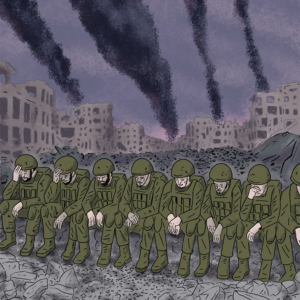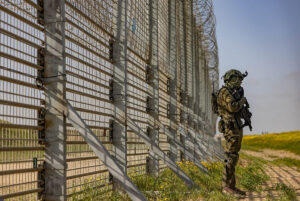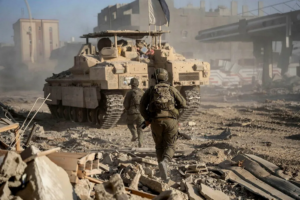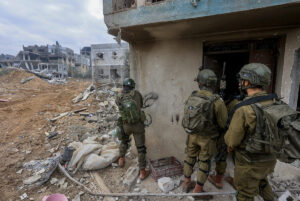IDF soldiers reveal what no Israeli wants to hear about months of fighting in Gaza

Illustration by Aron Ehrlich
Tom Levinson reports in Haaretz on 3 July 2025:
She stands in front of the cameras. Her eyes are red, her voice cracked. The tears flow freely, but she doesn’t try to wipe them away or stop them. The anchor asks her to talk about him. He’s used to asking such questions. She’s not used to answering them. Still, she emphasizes that she wasn’t surprised. “Since October 7, we’ve been living in fear. Every knock on the door, every phone call,” she says.
And then she decides to break the script. Instead of talking about what a wonderful person he was, instead of saying there was no one else like him, she chooses to say something else entirely. “From the moment he finished high school, he’s been fighting, nonstop. He was already exhausted. They’re all exhausted. Mentally, they’re completely drained,” she says. “This has to stop.”
That moment came last week, a day after her son, Staff Sgt. Niv Radia, was killed along with six other soldiers by an explosive device in southern Gaza. Speaking on Israel’s most-watched news channel, Radia’s mother, Alexandra, managed to shock many – perhaps even shake the foundations of public discourse. It was a rare moment in which the wall the army has tried to build between the public and the daily toll on combat soldiers began to crack.
The voices of reservists are often heard. They speak out about the impact on their businesses, their families, and the inequality they feel compared to segments of the population that don’t serve. But the voices of active-duty soldiers, those doing the daily fighting for nearly 21 months now, remain largely unheard and unknown to the Israeli public.
Even when journalists are embedded with IDF combat units, what they see isn’t the day-to-day reality – it’s a carefully orchestrated performance. Soldiers interviewed are handpicked by commanders and IDF spokespersons and thoroughly briefed on what they can and cannot say. And so, reporters return with the same clichés: “This is a generation of lions,” they declare. “Morale is sky-high.”
But active-duty army soldiers who spoke to Haaretz in recent months paint a very different picture – one that bears little resemblance to the official narrative. They describe mounting exhaustion, severe physical and psychological strain, and a constant fear that they’ll be the next to have their names released as fallen. Most refused to be quoted on the record. Five agreed to speak. They had just one request: “You sent us to war – now listen to what we have to say.”
* All names in this article have been changed.

An Israeli soldier stands next to the fence encircling the Gaza Strip, 18 March 2025
Yonatan, 21, Kfir Brigade
“It happened a little after we entered Jabalya last November. During the day, the heat was unbearable – at night, we froze. Sand and dust clung constantly to my skin. We hardly saw any people, just dogs roaming everywhere. They were looking for food – anything, even rotting scraps. Our company commander warned us that anyone who so much as petted them would ‘face a court-martial and end up in jail.’ But I didn’t care. When no one was looking, I’d sneak them slices of sausage.
“A few days later, we were positioned near a house when a pack of dogs came close, barking nonstop. Our deputy commander got annoyed and decided to shoot one of them. The dog howled in pain – then fell silent. The others scattered, but he kept going, aiming down his sights and shooting another dog, then a few more. ‘They need to learn not to come near us. These are terrorists’ dogs – probably rabid,’ he said with a grin. I was furious, but I didn’t say a word. That night, I was ashamed of myself for not speaking up, for not trying to stop him.
“The next morning, we were sent on another house-clearing mission. We scanned the building with a drone and didn’t see anything, so we went in. Two minutes later, there was an explosion. The blast threw me through the air, and I couldn’t understand what had happened. Suddenly, I realized my mouth was full of blood. I thought I was wounded, but I wasn’t – it was the blood of my best friend in the unit. He kept calling my name, begging me to help, but I didn’t know what to do. I froze.
“Eventually the medics arrived and evacuated him. For days after, I couldn’t sleep, couldn’t eat – everything tasted like blood. We just kept going, clearing houses like nothing had happened, like everything was normal. Afterward, we were sent out of Gaza for a little while to ‘refresh,’ but I couldn’t do anything. I felt like someone had taken part of my soul.
“One morning the commander told us we were going back home to rest and everyone was excited – but I felt nothing. I felt dead, empty, completely numb. Right before sunset, the commander told me I had to guard the equipment at 2 A.M. I stood there for a few minutes before I felt like I couldn’t breathe – everything was closing in on me. I ran off to wash my face. When I came back, my officer was waiting. ‘Aren’t you ashamed of abandoning your post?’ he yelled. Then he told me I’d face disciplinary charges the next day.
“By morning, I was standing trial in front of the battalion commander. He asked if I had anything to say, but no words came out. ‘You’re getting 28 days of confinement,’ he said.
“I didn’t know what to do. When no one was looking, I grabbed my things and ran. Within hours I was sitting on the sand at Gordon Beach in Tel Aviv, still in uniform. I changed into civilian clothes and just sat there, feeling the cool breeze. I opened my phone and scrolled through messages with the friend who’d been injured. I wanted to send him something – even though he was unconscious – but I couldn’t figure out what to say. The hours passed and I had no idea what to do. Go back to base? Go to my parents? And what would I even tell them? Lie and say they let us out? Tell the truth? I had no clue.
“They taught us how to charge forward, how to fix a jammed weapon, how to bandage a wounded friend. But no one taught me what to do after you taste your best friend’s blood.”

Soldiers in Gaza, July 2024
Or, 20, Paratroopers Reconnaissance Unit
“My breaking point didn’t come in Lebanon or Khan Yunis – it happened in Tel Aviv. After ages without being home, they finally gave us 48 hours’ leave. It was a week after my birthday, and my parents wanted to celebrate with a big family dinner. I just wanted to stay home and sleep – but I didn’t want to disappoint them.
“When we got to the restaurant, everyone hugged and kissed me and asked how things were. All I could manage was a vague ‘fine.’
‘Everyone kept eating. The smells overwhelmed me – I thought I was going to throw up again. I didn’t understand what was happening – and then it hit me: it was the smell of corpses’
“I ordered shrimp pasta. When it arrived, I felt everything rise up inside me – like I was going to throw up. I rushed to the bathroom and vomited harder than I ever had in my life. Then I splashed water on my face and looked in the mirror – I looked awful, like I’d aged ten years. When I came back, my grandmother looked at me and asked, ‘Are you okay? You’re white as a ghost.’ I didn’t know what to say. I just wanted to disappear.
“Meanwhile, everyone kept eating. The smells overwhelmed me – I thought I was going to throw up again. ‘Why aren’t you eating?’ they asked over and over. I couldn’t answer. The smell was driving me mad – I couldn’t get it out of my body. At first, I didn’t understand what was happening – and then it hit me: it was the smell of corpses.
“A few days earlier, we’d approached the rubble of a house in Khan Yunis that had been bombed by the air force. In the debris – what was once walls – we suddenly found five, maybe six bodies. There were flies everywhere, and I think dogs had torn at the flesh. There was barely anything left. Two of them were small children – I saw their bones. It was horrible, unforgettable, something that still haunts my nights. But more than anything, I remember the smell – it took over my body, clung to my clothes. Even after I sprayed myself with deodorant nonstop that night, it wouldn’t leave me.
“After the restaurant we went home, and I went straight to my room without saying a word. I didn’t want to leave until Sunday, but my friends insisted we go to a party in Tel Aviv. We drank endlessly – all night. I tried to smile, tried to laugh. ‘What’s up with you?’ they asked. ‘Nothing, nothing,’ I replied. Around 1 A.M., the DJ played some track I didn’t know with pounding bass. It felt like everything was closing in – like I couldn’t breathe. I ran to the bathroom. It smelled like sewage and it reminded me of Gaza.
“In the stall, I tried to calm my breathing, but nothing helped. My heart was pounding out of control. I left the club without saying anything to my friends, grabbed a taxi that cost me something like 300 shekels, went home and crashed. I stayed in bed all weekend, until it was time to go back.
“Sunday morning, I reported for duty in the Gaza border area. We packed the gear and loaded up quickly onto the Humvees that took us back in. I wanted to jump off. I wanted to run – but I didn’t have the guts. So I kept going. Another week of explosions. Another week of socks glued to my skin, of heat I can’t even describe. A living nightmare. I just want it to be over already – please. I’m exhausted as if I’m 80 years old.”
Omer, 21, Givati Brigade
“Sometimes when I think about it, it’s hard to believe this war has been going on for only 20 months – it feels like 10 years. I was there from the start, when they rushed us to the kibbutzim in the Gaza border region just hours after it all began. I still haven’t been able to process what I saw there. Burned-out cars, people screaming, gunfire, explosions. What I remember most is the smell of corpses in Kfar Aza – the smell of death, like a steak forgotten on the grill.
“But honestly, there are a lot of things I don’t remember at all – entire hours wiped from my memory. What did I even do there? I have no idea. And there was no time to think about it anyway. Right after October 7 we started preparing to go into Gaza. We were in a kind of high – we wanted it so badly. Now it just seems so stupid to me. I’ve lost track of how many people I knew who’ve been killed – from my battalion, my brigade, my school, my neighborhood. I don’t have the strength to hear about one more. It breaks me.
“They didn’t even let me attend most of the funerals. They said we were needed – that they couldn’t let everyone go. And the ones I did attend – they were awful. How can you sit there and listen to the battalion commander recite clichés about friends of mine he didn’t even know, about fighters he never cared about?
“People think soldiers die in battle, but the truth is, lots of them died for no reason – because of officers’ negligence, or because there weren’t enough munitions to bomb a building before sending us into it. Then the media says he died from an explosive device and everyone thinks it makes sense. It feels like no one cares. How many more friends do I have to bury before people wake up?
“All of us have wills saved in our phones – in the notes app. Sometimes at night we talk about what our funerals will be like, try to guess how many people will come, if our ex will cry. ‘Do you think Tuna [an Israeli rapper] would agree to sing at my funeral if I put it in my will?’ a friend once asked me. ‘If I die, promise me you’ll tell my mom I didn’t suffer – that it wasn’t hard for me,’ another friend said. Two weeks later he was wounded by an anti-tank missile.
“And if that’s not enough, now they’re forcing us to do another four months of reserve duty. No one asks if we want to or if we even can. ‘There’s nothing we can do – we’re short on soldiers,’ the officers say. And if anyone complains, they threaten him with jail – call him a traitor, a coward. So most of us stay quiet. Sometimes we cry to our moms on the phone, or to a friend we feel safe with. But even that doesn’t always help. It’s just shit. I’ve had enough. I can’t do it anymore.
“In high school I was sure that right after the army I’d take the psychometric exam and go study medicine – like I always dreamed. But now? I just want to run away. Travel. Rest. Do drugs. Forget. I don’t know what will be left of me. I already know I’m not the same person I was – that’s for sure.”

Illustrative photo of Israeli soldiers operating in Beit Lahiya, northern Gaza Strip, 28 November 2024
Yair, 21, Nahal Reconnaissance Unit
“There were ten of us. It was 2 A.M., maybe 3. Just a routine ambush in the northern part of Gaza, I think near Beit Lahia. I suddenly woke up in a panic and realized everyone was asleep – even the officer. I woke him up, and he freaked out, started yelling at the whole team like a madman. It was surreal – I think he forgot that yelling like that could expose our position, but no one dared say anything.
“‘You bunch of idiots,’ he screamed. ‘You want to die out here? What are you, brain-dead?’ He completely lost it – like something had been building inside him for months and just exploded. The next day, he pulled me aside and made me swear not to tell anyone outside the unit that he had fallen asleep.
“It wasn’t the first time something like that happened and honestly, any soldier who’s served in Gaza knows it. You don’t sleep during the day and then you’re sent on night missions – we’re just collapsing. It might sound weird to admit, but it’s kind of a miracle Hamas hasn’t taken advantage of it more.
“Every time there’s some serious incident in the news, people criticize us – ‘How could this happen?’ they ask. But what do you expect when we’ve been fighting for months and barely get to go home?
“People who’ve never been here think the hard part is just the big events – when soldiers are killed or wounded. But the struggle is also in the small stuff, the things no one talks about on the news. Do you know what it’s like to walk around for days with a ceramic vest glued to your back? What it means not to take off your boots for ten days straight? To lie in the dirt covering your team and not be able to keep your eyes open? To be packed so tight together that even the people you love drive you crazy?
“I remember once a guy on our team kept humming a song that got stuck in his head. It pushed me over the edge and I threw a can of tuna at him. ‘What the hell’s wrong with you?’ he shouted. We almost got into a fight. If the others hadn’t stepped in, I don’t know how it would’ve ended. I apologized, but I’m still ashamed I did that.
“The worst part is it doesn’t just happen with the guys in the unit – it happens with my family too, with my girlfriend. A few months ago, I came home and just started yelling at her – for no reason, just because she moved one of my shirts. She started crying and walked out. I begged her to forgive me. I didn’t know what to do. I started crying too and she hugged me. I don’t think I’ve ever cried like that before.
“Later we tried to have sex and I just couldn’t. Nothing worked. She tried to calm me down, but I went into this spiral – convinced this was how it would be from now on, that the war had broken me. That she would leave me.
“Lately, my hair has even started falling out from the stress. I keep touching it, pulling it without even realizing. It’s destroying me. I keep telling myself I have no right to cry – that I’m lucky compared to others. One of our squads was completely wiped out. I’m alive. I wasn’t hit by a missile or an explosive device.
“But still, it’s hard. I don’t know if I’ll ever recover. I just want everything to be normal again – like it used to be.”

An Israeli soldier stands next to the fence encircling the Gaza Strip, 18 March 2025
Uri, 22, Yahalom combat engineering unit
“At some point, I just stopped believing in what we’re doing. During the first year, I was all in – totally committed to every mission. I really believed we were part of something historic, that we were protecting Israeli civilians, that we were helping to rescue the hostages.
“But little by little, I started to doubt it. After you hear about another hostage killed because of an airstrike, after you attend yet another funeral for a friend – it just starts to fade.
“I can’t go on another mission. I can’t go back to the same areas we’ve already been through a million times, investigate another tunnel shaft, enter another building that might be booby-trapped. And for what? Anyone with half a brain can see this war is continuing for political reasons. There’s no reason to keep going. We’re not achieving anything – we’re just risking our lives over and over again.
“Even the commanders don’t know how to explain it anymore, how to convince us to keep at it. Except for the religious guys, no one understands what we’re doing. No one believes we’re helping to bring the hostages home. If anything, we’re putting them in more danger.
“Every time I got close to a tunnel shaft, that thought would hit me. What if the intel is wrong? What if there are hostages down there? What if the terrorists hear us and kill them? And if that happens – how could I live with myself? How could I go on?
“The officers will call it a mistake and say that’s just war – and I’ll have to live with the guilt and shame. No one’s going to help me. Just like no one’s helping my wounded friends. Some of them the commanders didn’t even bother to visit. They were just left on their own.
“Luckily, I’m about to be discharged. But what about the rest of them? I look at the younger soldiers in my unit and I can’t help but wonder – who will live and who will come home in a coffin? It’s awful, but that’s our reality. This has to stop. We can’t bring back the ones we’ve lost, but there are still so many more we can save.
“When will you understand that it’s time to end this? When there are 900 dead? A thousand? Please – stop. Speak out. Protest. Don’t let all this death keep going.”
This article is reproduced in its entirety
